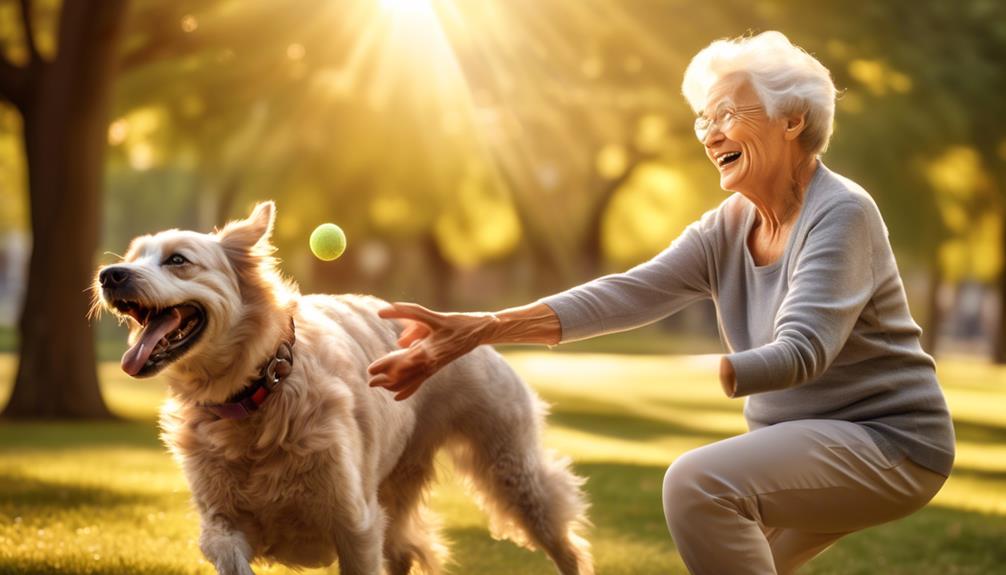Have you ever thought about the profound healing benefits that pets can have on elderly individuals?
The impact of pet companionship on the health and well-being of older adults is both fascinating and heartwarming.
From boosting cardiovascular health to alleviating feelings of isolation, pets play a vital role in enhancing the lives of seniors in ways that may surprise you.
Join us as we uncover the untold benefits of having furry or feathered friends by your side, and discover how these companions can be the key to unlocking joy and overcoming challenges in the golden years.
Key Takeaways
- Pets combat loneliness and boost mood in seniors.
- Senior pet ownership provides emotional stability and routine.
- Pets reduce stress, enhance mental well-being, and offer unconditional love.
- Interacting with pets improves physical health and fosters emotional connections.
Mental Health Benefits of Pet Companionship
Interacting with pets has been scientifically proven to significantly enhance the mental well-being of seniors, reducing symptoms of depression and fostering a sense of joy and happiness. The emotional bond formed through pet companionship provides a profound source of comfort and companionship for older adults, helping to alleviate feelings of loneliness and isolation.
Studies have shown that seniors who engage with pets experience lower stress levels, improved emotional well-being, and an increased sense of purpose in their daily lives. This emotional connection with animals not only boosts mood but also enhances overall mental health outcomes for seniors by promoting the production of feel-good hormones like oxytocin.
The consistent presence of a pet offers a reassuring routine and a constant source of love and support, leading to improved emotional stability and resilience. Through the simple act of caring for a pet, seniors can find solace, companionship, and a renewed sense of vitality in their lives.
Physical Well-being Through Pet Interaction

Pets play a crucial role in enhancing the physical well-being of seniors through regular interaction and companionship. Engaging with pets leads to increased physical activity, which in turn improves cardiovascular health in older adults.
Studies show that seniors who interact with pets experience lower blood pressure, enhanced immune systems, and reduced stress levels. These interactions contribute to improved overall well-being and health outcomes for seniors.
The calming effects of pet companionship are immediate, providing a sense of comfort and relaxation. By caring for a pet and being active in their lives, seniors can see significant benefits not only in their physical health but also in their mental and emotional well-being.
The bond formed with a pet can have a profound impact on a senior's quality of life, offering companionship and support that can help combat feelings of loneliness and isolation.
Combatting Depression With Senior Pet Ownership
Seniors who find solace in the companionship of pets often discover a powerful ally in combating the depths of depression. The bond formed through senior pet ownership goes beyond mere companionship; it provides emotional support, unconditional love, and non-judgmental companionship, all essential elements in managing senior depression. Here are three key ways in which senior pet ownership can be a game-changer in the battle against depression:
- Emotional Stability: Pets offer a constant source of comfort and joy, helping seniors navigate through challenging emotional states and reducing feelings of loneliness.
- Routine and Purpose: Caring for a pet establishes a sense of routine and responsibility, which can be particularly beneficial in managing depression symptoms and providing a sense of purpose in daily life.
- Unconditional Love: The unwavering love and acceptance from a pet can fill a void that sometimes exists in the lives of seniors, offering a unique form of companionship that's priceless in combating senior depression.
Enhancing Quality of Life With Pets

Enhancing the overall well-being and quality of life for older individuals is a multifaceted process that can be significantly enriched through the presence of animal companions. Seniors benefit from the companionship of pets, leading to lower blood pressure, reduced stress levels, and improved heart health. Additionally, pet ownership encourages increased physical activity, boosts immune systems, and enhances cardiovascular health. Regular interaction with pets not only alleviates feelings of loneliness but also provides essential emotional support and a sense of purpose.
| Benefits of Pets for Seniors | |
|---|---|
| Physical Health | Emotional Well-being |
| – Lower blood pressure | – Alleviates loneliness |
| – Increased physical activity | – Boosts emotional well-being |
| – Stronger immune systems | – Provides social support |
| – Improved heart health | – Promotes a sense of purpose |
Pets play a vital role in reducing stress levels, enhancing mental health, and fostering emotional connections for seniors. The immediate calming effects and overall enhancement in quality of life that pets bring highlight the profound impact of animal companions on the well-being of older individuals.
Social Connection and Emotional Support Through Pets
Connecting with animal companions not only alleviates feelings of loneliness but also provides crucial emotional support, fostering a sense of belonging and well-being in older individuals. Seniors benefit greatly from the social connection and emotional support that pets offer. Here are three key ways pets enhance the lives of seniors:
- Companionship: Pets serve as loyal companions, offering constant presence and unconditional love. This companionship helps seniors combat feelings of isolation and provides them with a sense of purpose and routine.
- Emotional Well-being: Interacting with pets can lead to reduced stress levels and improved mental health in seniors. The bond formed with a pet can bring joy, laughter, and comfort, all of which contribute to emotional well-being.
- Overcoming Depression: The non-judgmental nature of pets makes them excellent emotional support systems for seniors facing depression. The presence of a pet can help alleviate symptoms of depression and offer solace during difficult times, ultimately enhancing the overall quality of life for seniors.
Frequently Asked Questions
How Does Owning a Pet Improve Quality of Life for Older People?
Having a pet enhances the quality of life for older people in various ways. Companionship from pets reduces loneliness, while oxytocin release decreases stress and anxiety.
Daily activities like walks with pets improve mood and cardiovascular health. Caring for pets creates routine and purpose, managing depressive symptoms.
Social interactions facilitated by pets combat social anxiety, fostering connection and well-being. Overall, owning a pet brings joy and improves mental and physical health for seniors.
How Do Pets Contribute to Healthy Aging?
Pets contribute to healthy aging in various ways. They provide companionship, reduce loneliness, and promote physical activity. Their presence can lower stress levels, improve cardiovascular health, and enhance mental well-being. The bond between seniors and their pets fosters a sense of purpose, leading to improved overall health and happiness. Regular interaction with pets enhances cognitive function, contributing to a healthier and more fulfilling aging process.
Does Owning a Pet Help With Depression?
Owning a pet can indeed help with depression. The companionship and emotional support they offer can reduce feelings of loneliness and isolation, common triggers for depression.
Daily interactions with pets, like playing or walking, can boost mood and increase serotonin levels. Taking care of a pet also provides a sense of purpose and structure, enhancing overall quality of life.
Pet ownership has been linked to lower stress and anxiety levels, aiding in managing and alleviating depression.
What Is the Best Small Pet for Depression?
When it comes to finding the best small pet for easing depression, there are various options to consider.
Guinea pigs, with their gentle and sociable nature, can provide excellent companionship.
Fish tanks offer a calming environment.
Smaller pets like hamsters or gerbils are manageable and playful.
Birds such as budgies or canaries bring cheer.
And rabbits, affectionate and social, can foster a sense of purpose.
Each pet has unique qualities that can bring joy and alleviate loneliness.
Conclusion
In conclusion, the bond between seniors and their pets is truly remarkable. From improving mental health to enhancing physical well-being, the benefits of pet companionship are undeniable.
As we continue to uncover the positive impact of pets on seniors' lives, let's celebrate the joy and love they bring.
So next time you see a senior with their furry friend, remember the power of this special bond in promoting health and happiness.










